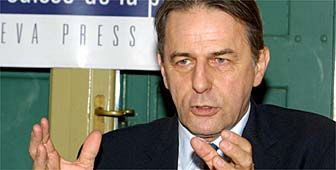Rogge outlines plans for downsized Olympic Games

Olympics chief Jacques Rogge has fleshed out plans for a smaller Olympic Games, and given assurances about security in Salt Lake City.
Rogge, elected president of the Lausanne-based International Olympic Committee (IOC) last July, has made reducing the size and costs of the Games one of the priorities of his tenure.
The Belgian was in charge of coordinating the 2000 Olympics in Sydney. He told a press conference in Geneva that the experience led him to the conclusion that, even if they were the best Games anyone could remember, they were becoming increasingly unmanageable, that only a large, rich, sophisticated city could host.
In scaling back the Games, Rogge hopes that smaller or poorer countries will not be excluded from bidding to host the biggest sporting event in the world. The IOC chief is aware that Africa and South America have never staged the Games.
Host’s burden
“If we want the success of the Games to last, we have to the burden of hosting them,” said Rogge, who has created a special commission to tackle this problem. This team will deliver its recommendations to a session of the IOC executive in Mexico in November.
“Making the Games smaller and less sophisticated will help developing countries,” Rogge said. However, he stressed that developing countries still had to meet minimum standards. “We cannot sacrifice a generation of athletes for the sake of poorer quality Games,” he added.
Rogge stressed that he did not want to reduce the number of sports contested, nor the number of competing athletes. But the composition of the programme – the actual sports in the Olympics – would be reviewed.
With popular media-friendly sports like rugby, golf and squash queuing up to join the Olympic family, which will mean that some current sports will be dropped.
Large entourage
The IOC chief would also like to see the number of accreditations for non-athletes frozen. Some 195,000 accreditations were accorded for the 2000 Games, of which only 10,500 were competitors, or “18 people for every athlete”. He pointed out that the number of accredited journalists had increased from 11,000 at the 1992 Barcelona Olympics to 25,000 in Sydney.
He believes the cost of building facilities could also be cut. Too many immense stadia become white elephants, rarely being filled to their full capacity once the Olympic circus has rolled out of town. The cost of technology has also sky-rocketed. Where in Seoul in 1988, it amounted to eight per cent of the budget, it now stands at 28 per cent.
Security
One cost that will not be cut is security, although Rogge insisted that the costs for security for next month’s Salt Lake City Winter Games were no higher than at Sydney, even taking into account the increased threat of terrorist attack in the wake of September 11 and the military campaign in Afghanistan.
“September 11 has not awakened us to the need for security. Security has been the IOC’s number one priority since 1972,” he said referring to the murder of 11 Israelis by Palestinian terrorists at the Munich Olympics. Indeed, the scenario of a hijacked plane being crashed into an Olympic venue “has been on the IOC risk list for more than 15 years”, he said.
He said the security strategy for the Salt Lake Games were reviewed after September 11 and found to be adequate.
Doping
As well as reducing the Olympics Games to more manageable proportions, Rogge’s other chief priority is the fight against doping. The IOC chief has famously stated that this is a battle that will never be won. But he is determined to reduce drugs use in sport to an “absolute minimum”.
He confirmed that for the first time ever, all endurance athletes competing in Utah would have to undergo tests for EPO, and that a new system of drugs passports for athletes would be introduced.
However, he said he was not certain that the World Anti-Doping Agency, which was set up in 1999, would be fully operational before the Athens Olympics in 2004.
Rogge said the Olympics would retain the “unities” of Greek drama: those of time, place, action. The Games would still last for just two weeks and be held every four years, and would not be jointly organised by more than one country. The IOC also wants the best athletes in the “most representative sports” competing at the Games, Rogge said.
by Roy Probert

In compliance with the JTI standards
More: SWI swissinfo.ch certified by the Journalism Trust Initiative







You can find an overview of ongoing debates with our journalists here . Please join us!
If you want to start a conversation about a topic raised in this article or want to report factual errors, email us at english@swissinfo.ch.